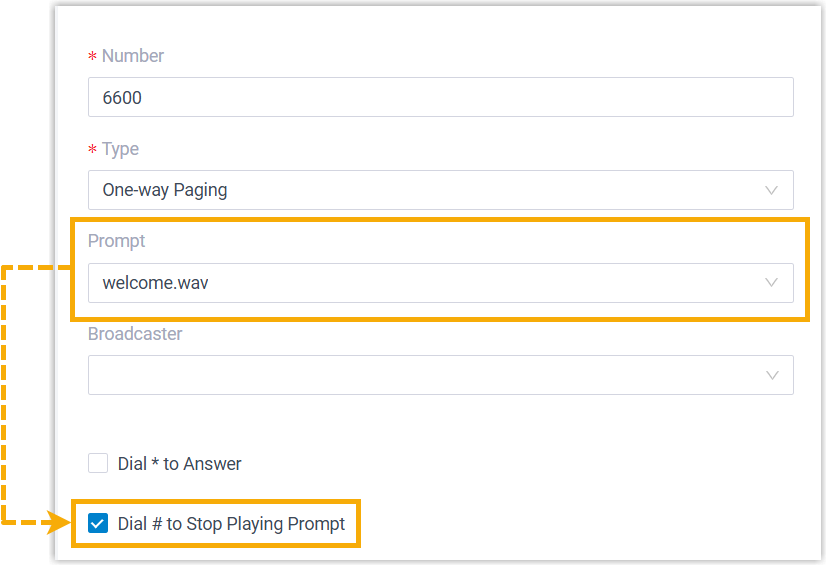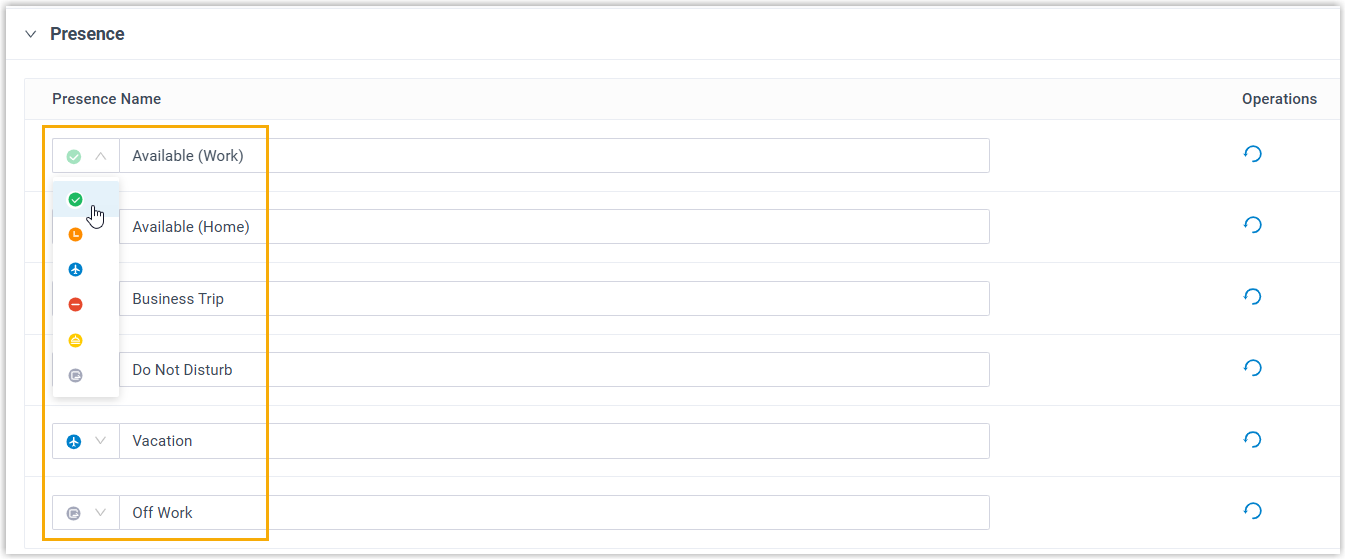Yeastar P-Series Software Edition 83.19.0.70
Release date: June 9, 2025
New features
- Custom Prompt Language
- Added support for customizing language for system prompts in the following features, independent of the system's global language settings.
Improvements and bug fixes
- Web Interface
- Added support for the web interface language Türkmenistan (Turkmen).
- Extension
-
- Added a configuration item Notification Email
Language, which allows for customizing the
language of email notifications for an extension individually
(Path: ).Note: This setting only applies to the system's default email templates, and is ignored for custom templates.

- Optimized the voicemail language settings of extensions: The entry of the feature settings has been moved from to , allowing for customizing the prompt language that callers will hear when accessing the extension's voicemail.
- Added a configuration item Notification Email
Language, which allows for customizing the
language of email notifications for an extension individually
(Path: ).
- Linkus Server
- Added support for configuring the valid period (in days) of the login credentials sent in the Linkus Welcome Email (Path: ).
- Trunk
-
- Added a configuration item Generate Linked
Hostname, which allows you to decide whether to
use FQDN or NAT domain name as the hostname for generating the
WebRTC Inbound Call Link and Default Call Template Embed Link.

- Fixed the trunk issue: After recovering from an unexpected network disconnection, outbound calls through SIP register trunks failed.
- Added a configuration item Generate Linked
Hostname, which allows you to decide whether to
use FQDN or NAT domain name as the hostname for generating the
WebRTC Inbound Call Link and Default Call Template Embed Link.
- Auto Provisioning
-
- Added support for auto provisioning the following Yealink
phones:
- T85W, T87W, T88W, T88V
- T73W, T73U, T74W, T74U, T77U
- Added support for auto provisioning the following Gigaset
phones via RPS method:
- P820 IP PRO
- P850W IP PRO
- P710 IP PRO
- Added support for downloading and uploading auto provisioning
custom templates (Path: ), which allows template reuse across multiple
PBXs without the need to recreate templates manually.Note: The downloaded template files are encrypted and cannot be opened directly; they can only be uploaded and parsed by the PBX.

- Added support for auto provisioning the following Yealink
phones:
- Hot Desking
- Added support for retaining phone configurations when extension users
log out of a Hot Desking phone.Note: To achieve this, you need to enable the option Retain phone configuration when Hot Desking guests log out (Path: ).

For more information, see Retain Configurations for Hot Desking Phones.
- Paging/Intercom
-
- Added a configuration item Prompt Playback
Times, which allows you to specify how many
times the prompt will be played and repeated (Path: ).

- Added a configuration item Dial # to Stop Playing
Prompt, which allows you to specify whether
broadcaster(s) can dial # to stop playing the prompt during
playback when a specific prompt is configured for a paging group
(Path: ).

- Added a configuration item Prompt Playback
Times, which allows you to specify how many
times the prompt will be played and repeated (Path: ).
- System Preference
- Added support for customizing presence statuses and corresponding icons,
providing greater flexibility in indicating extension users'
availability (Path: ).Note: The custom presence setting will be synchronized across Linkus UC Clients with the following versions:
- Linkus iOS Client: Version 5.15.8 or later
- Linkus Android Client: Version 5.15.4 or later
- Linkus Windows Desktop: Version 1.13.3 or later
- Links Mac Desktop: Version 1.13.3 or later
For more information, see System Preferences.
- Public IP and Ports
- Added a configuration item Prioritize NAT over FQDN, which allows you to define the priority of NAT and FQDN when both are enabled (Path: ).
- High Availability
- Added Maintenance Mode for Secondary Server and Redundancy Server. When Primary Server or Working Server is under maintenance
(e.g. firmware upgrade or system reboot), it may fail to respond to
heartbeat packets from Secondary Server or
Redundancy Server. In this case, you can enable and schedule
Maintenance Mode on the Secondary Server or
Redundancy Server to temporarily suspend health monitoring, so
as to prevent takeover during the maintenance window.
For more information, see Enable and Schedule Maintenance Mode on Secondary Server and Enable and Schedule Maintenance Mode on Redundancy Server.
- Security
- Fixed the SSH access issue: Failed to log in to the console via the support account.
- Active Directory Integration
- Optimized the group synchronization: When a group object is used as the Base DN for synchronization, the PBX will synchronize both the group and its associated member users, ensuring correct group membership relationships.
- API
- Optimized the API interfaces for the following features.
- Linkus Web Client
-
- Optimized extension preference settings: Added support for
customizing the language of email notifications sent to the
extension (Path: ).

- Optimized user experience in Call Center
Console:
- For Wallboard, added filters to
the Agent and
Status columns in the list
view, enabling granular insight into the number of
agents in each status.

- For Queue Panel, added a filter
option in the Agent panel,
enabling the display of only online agents.

- For Wallboard, added filters to
the Agent and
Status columns in the list
view, enabling granular insight into the number of
agents in each status.
- Optimized extension preference settings: Added support for
customizing the language of email notifications sent to the
extension (Path: ).
- Call issue
- Fixed the following call issues:
- Calls rejected on Linkus Mobile Client continued ringing on the caller's side.
- There was no audio after answering an inbound call.


